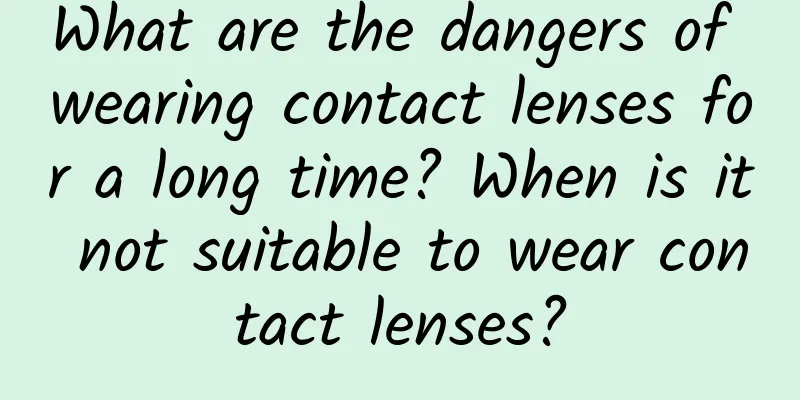What are the dangers of wearing contact lenses for a long time? When is it not suitable to wear contact lenses?

|
In recent years, many women who love beauty have worn contact lenses, some for convenience in daily life, and some for beauty. However, you may not know that improperly wearing contact lenses may cause eye damage. Some incorrect habits will not only fail to make your eyes bright, but will hurt your soul windows. Do you know the harm of wearing contact lenses? Below, let's take a look at the relevant knowledge about wearing contact lenses with Encyclopedia Knowledge Network. Contact lenses not only bring great improvements in appearance and convenience to patients with refractive errors such as myopia, hyperopia, astigmatism, etc., but also provide a wide field of vision and realistic vision. In addition, they also play a special role in controlling the development of myopia and astigmatism in adolescents and treating special eye diseases. Hospital experts remind that wearing contact lenses requires a detailed examination at a regular hospital or optician's agency, choosing contact lenses that are suitable for you, and paying attention to eye hygiene to avoid causing other eye symptoms. If you feel uncomfortable after wearing them, go to the hospital for examination in time. The dangers of wearing contact lenses1. Decreased eye resistance Contact lenses prevent the cornea from coming into contact with air, and the eyes will suffer from a lack of oxygen, which is similar to the human body's "altitude sickness", making it impossible to metabolize normally and reducing resistance. Experts suggest: Don't wear glasses when sleeping. The cornea of the eye is a very special organ. It has no blood vessels and breathes with the help of air and surrounding tissues. If you sleep with glasses on, it will affect its breathing, and in severe cases, it may cause corneal infection! 2. Cause visual fatigue and dry eyes Wearing contact lenses for a long time can easily cause visual fatigue and even dry eye syndrome, which can lead to sore and itchy eyes, foreign body sensation, excessive eye mucus, dryness, burning eyes and blurred vision. Experts suggest: When choosing contact lenses, the main indicator is the water content. If the water content is too high, the lens will absorb moisture from the eyes, causing discomfort and easy dryness. If the water content is too low, the lens will have poor oxygen permeability and the eyes will easily feel dry, because oxygen is conducted through the water in the lens. Therefore, the ideal water content is between 50% and 60%. 3. Cause eye allergies Contact lenses absorb proteins, lipids, collagen, etc. in tears, causing them to deposit on the surface of the lens, breeding bacteria, and causing corneal edema, corneal neovascularization and allergic reactions. Experts suggest: When using contact lenses, the components of human tears, secretions, impurities or foreign matter in the external environment will inevitably adhere to the lenses to form deposits. Even if you follow a strict process for care and cleaning, there will still be invisible deposits that remain on the lenses and cannot be removed. It is recommended to use monthly disposable contact lenses or replacement contact lenses with a shorter cycle than monthly disposable lenses. 4. Corneal abrasion, unable to receive correction Contact lenses can cause corneal abrasion, which may lead to serious consequences such as corneal epithelial detachment or perforation. The concavity of some contact lenses does not match the convexity of the cornea, which can cause irregular corneal abrasion and corneal ulcers, resulting in irreversible vision loss. Even after treatment, white spots will remain on the cornea. Experts suggest: The depth of small scratches on the lens varies. In severe cases, they will cause irritation to the eye and damage the cornea surface. It is necessary to ask an ophthalmologist to determine whether the lens should be replaced. Some shallow scratches on the surface of hard contact lenses can be repaired by grinding, but soft contact lenses cannot be repaired. 5. Causes optic nerve paralysis Contact lenses attached to the eyeball for a long time can paralyze nerve endings and cause corneal hyposensitivity. Many patients are unaware of the onset of ulcerative keratitis. Experts recommend: Go to a regular hospital or optician for a detailed examination, choose contact lenses that are suitable for you, and pay attention to eye hygiene to avoid causing other eye symptoms. If you experience redness, dryness, pain, fear of light, decreased vision, etc. in your eyes while wearing contact lenses, you should go to the hospital for examination in time. 6. Accelerated corneal aging If you start wearing soft contact lenses at the age of 20, after 5 years, the number of corneal endothelial cells will be greatly reduced. After the invasion of water, it will easily cause corneal edema. After 10 years, the density of corneal endothelial cells will be equivalent to that of a 60-year-old person. You will not be able to withstand any eye surgery, even if cataracts occur when you are old. Experts recommend: Wear frame glasses or undergo laser vision correction surgery if possible for early myopia. When is it not appropriate to wear contact lenses?1. Wearing contact lenses during menstruation can easily cause eye congestion First of all, women's intraocular pressure is higher than usual during menstruation, and the area around the eyeball is more prone to congestion, especially for women with dysmenorrhea. Wearing contact lenses at this time will have adverse effects on the eyeball. Secondly, since the body's immunity decreases during menstruation, the local resistance of the eyes also decreases, and tear secretion decreases. Bacillus subtilis will multiply in large numbers, causing the bacterial metabolites to be deposited between the cornea and the lens, resulting in reduced oxygen permeability of the contact lens. The normal metabolism of the cornea is disturbed, thus causing bacterial corneal ulcers. 2. Wearing contact lenses when you have a cold will aggravate inflammation Colds are often accompanied by mild retinal inflammation, and contact lenses can easily aggravate the inflammation. In addition, patients carry a large number of viruses and bacteria on their hands, which can easily enter the eyes when wearing glasses. In addition, many anti-cold medicines contain ingredients that inhibit tear secretion, causing contact lenses to become too dry and less transparent, which in turn affects vision. Therefore, experts recommend: It is best not to wear contact lenses when you have a cold. 3. Don’t wear contact lenses on smoggy days First of all, when the air is foggy and the pressure is low, wearing contact lenses will aggravate corneal hypoxia and easily cause corneal damage. Secondly, the density of fine particles and bacteria in the air increases on foggy days. Contact lenses easily absorb these pollutants and, along with blinking, bring them between the lens and the eyeball, irritating the eyes and causing symptoms such as foreign body sensation, stinging, redness, and even causing keratitis, conjunctivitis, etc. It is recommended to wear frame glasses on smoggy days or when the air quality is poor. For those who must wear contact lenses, they should reduce the wearing time, reduce the time spent outdoors, take them off immediately when not in use, blink more, or use artificial tears to wash the cornea appropriately. At the same time, extend the time for disinfecting lenses every day, and ensure that the lenses are soaked in the care solution for at least 12 hours to sterilize. 4. The consequences of pregnant women wearing contact lenses are more serious Statistics show that 30% of pregnant women will have eye problems when wearing contact lenses. If not treated in time, it will affect their normal life, and even increase the difficulty of treatment due to the contraindications of taking medicines during pregnancy. "When pregnant women wear contact lenses, corneal damage is the first to be caused, and it will also cause a series of other diseases." Experts say that due to the great changes in the endocrine system of women during pregnancy, their corneal tissue will have mild edema, which increases the thickness of the cornea; and contact lenses themselves block the contact between the cornea and the air. Continuing to wear contact lenses during pregnancy will increase the degree of corneal hypoxia, reduce corneal sensitivity, and easily cause acute corneal damage. 5. When the body's immunity decreases At this time, tear secretion decreases, Bacillus subtilis will multiply in large numbers, and the bacterial metabolites will be deposited between the cornea and the lens, causing the lens to have reduced oxygen permeability and causing bacterial corneal ulcers. 6. Long-distance cycling will make the contact lens hard If you often ride a bicycle or motorcycle for long distances, you should not wear contact lenses. This is because when you ride a bicycle, the speed of air convection around you will significantly increase, which will cause the moisture in the contact lenses to decrease sharply, and the lenses will gradually dry and harden. Over time, the hardened lenses are likely to damage the corneal epithelial tissue, causing eye pain, itching, redness, swelling, and even inflammation. At the same time, foreign matter such as dust is more likely to enter the eyes when riding a bicycle, causing eye discomfort or even infection. 7. Wearing contact lenses on an airplane can cause serious damage to your eyes When passengers take a plane, their bodies are in a different environment from the ground. When wearing contact lenses on a plane, the eyes will be affected by the dry air and pressure imbalance in the cabin, causing various discomforts. For example, once bubbles are generated under the lens, hypoxia will occur, which can easily lead to corneal edema, which can not only cause vision loss, but also corneal ulcers and other problems. This is because the air pressure at high altitudes can affect the curvature of the cornea, and contact lenses are easily deformed. In addition, long-term drying will also make the material of contact lenses very fragile, and once broken, it may cause more serious problems. For this reason, experts remind that it is best to take off contact lenses before boarding the plane, and you can prepare a pair of ordinary, lightweight frame glasses. If you feel uncomfortable in your eyes, you can close your eyes and rest, do a simple eye massage, and then deal with it after getting off the plane. Remember not to rub your eyes rigidly. 8. Wearing contact lenses while swimming will absorb germs Wearing contact lenses has strict requirements on environmental conditions. Whether it is a swimming pool or a sea bathing beach, it cannot guarantee that the eyes are in clean and sanitary conditions. Contact lenses have adsorption properties, and pathogenic microorganisms in the water can easily deposit on the lenses. It is not advisable to wear contact lenses when swimming. People who often wear contact lenses have certain inflammation in their eyes. In addition, the stimulation of dirty water makes it easier to induce epidemic conjunctivitis and trachoma, which can be transmitted through swimming. 9. Avoid wearing contact lenses when catkins are flying in the spring In spring, if the catkins and pollen particles flying in the air get into the eyes, some people will suffer from allergic conjunctivitis. In addition, contact lenses are relatively fixed on the surface of the eyeball when worn, which provides an environment for bacteria and viruses to breed. When catkins and pollen accidentally enter the eyes, they are easy to attach to the contact lenses, causing viruses and bacteria to breed. Therefore, experts recommend that you try to wear ordinary frame glasses in spring to reduce the chance of your eyes being affected, or wear sunglasses when going out. |
<<: What is tinnitus? What to do about it? The most effective way to relieve tinnitus
>>: What causes yellow teeth? What to do? Tips on how to whiten teeth
Recommend
Menstruation becomes less frequent after the age of 35
The amount of menstrual flow and the length of me...
Diabetics should be careful about eating and drinking too much during the Chinese New Year!
How did you spend this year's Spring Festival...
Urinary tract infection Vulvar itching
Urinary tract infection is a relatively common di...
How to reduce belly fat after childbirth
Being a mother is a very happy thing. Having a ba...
Why don’t I have my period one and a half years after giving birth?
We all know that a woman's menstruation stops...
Female infertility examination items and costs
Nowadays, there are many people suffering from in...
What causes vulvar itching after menstruation?
I believe that female friends are no strangers to...
What are the drugs for Qinggong?
Unexpected pregnancy is something that many peopl...
What should pregnant women do if their feet itch and blister?
Now is the hottest time of summer, and for many p...
Can I use IVF if my follicles are not developing well?
In recent years, test tube babies have become mor...
Of the skin all over our body, why is the face the most prone to problems?
Have you noticed that in our body, facial skin se...
How to avoid gaining weight by eating hot pot? Can women eat hot pot during menstruation?
In winter, people always eat hot pot. If people w...
DNA gynecological examination
Pregnancy check-ups are necessary during pregnanc...
Can acupuncture treat infertility?
In today's life and work, people are becoming...









